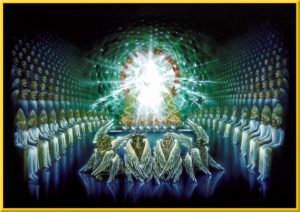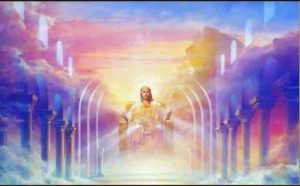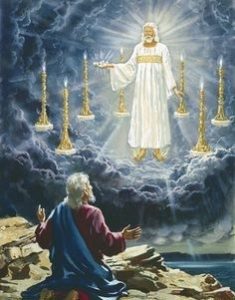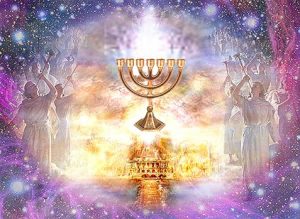
Shownotes
Wisdom-Trek / Creating a Legacy
Welcome to Day 941 of our Wisdom-Trek, and thank you for joining me.
I am Guthrie Chamberlain, Your Guide to Wisdom
Standing in the Council – Wisdom Wednesday

Thank you for joining us for our five days per week wisdom and legacy building podcast. We are broadcasting from our studio at The Big House in Marietta, Ohio. Today is Day 941 of our trek, and it is Wisdom Wednesday.
Creating a Biblical worldview is important to have a proper perspective on today’s current events. To establish a Biblical worldview, you also have to have a proper understanding of God’s word. Especially in our western cultures, we do not fully understand the Scriptures from the mindset and culture of the authors. In order to help us all have a better understanding of some of the more obscure passages in God’s word, we are investing each Wisdom Wednesday reviewing a series of essays from one of today’s most prominent Hebrew Scholars Dr. Micheal S. Heiser. He has compiled these essays into a book titled I Dare You Not to Bore Me with the Bible.
What does it take to be a Prophet of God? Today’s essay will lay out the qualifications as we explore…
Standing in the Council

Most people think a prophet is someone empowered by God to foretell the future. No doubt, prophets announced God’s intentions, but forecasting future events wasn’t their primary job description. A prophet’s chief task was to serve as God’s mouthpiece to His covenant people Israel and to her enemies. So how did someone become a prophet? Was there some sort of heavenly qualification? In fact, there was.
You might think the standard for a prophet was whether their words came to pass exactly as uttered as described in Deuteronomy 18:15-22. That is actually a by-product of the real litmus test, which we read about in Jeremiah [23:18] & 22.
“Have any of these prophets been in the Lord’s presence (or the council (sod))
to hear what he is really saying?
Has even one of them cared enough to listen?
If they had stood before me (the council (sod)) and listened to me,
they would have spoken my words,
and they would have turned my people
from their evil ways and deeds.”
What does it mean to “stand in the council”? The one essential test of a prophet—that preceded their ability to deliver a divine message was that the prophet had to see and hear God in His council or presence.
In the Bible, God and His heavenly host were thought to live and conduct business in the divine throne room. This assembly, with God as its Judge or CEO, is called “a divine council or heaven’s court” (Psalms 82:1: 89:5-7). God chose prophets and commissioned them directly for ministry. When a prophet “stood in the council,” he had a direct encounter with God in His throne room. This motif of “standing in the council” is a repeated pattern in the Bible.
In the case of Isaiah, the prophet was transported to the throne room of Yahweh (Isaiah 6:1-6) to receive his call to service (Isaiah 6:8-9). For Ezekiel, the circumstances were reversed, with the throne of the Lord coming to him (Ezekiel 1:1-14. 26-28). Jeremiah was also commissioned via a direct encounter with God. At the beginning of his ministry, the “word of the Lord” came to him (Jeremiah 1:4) and appointed him a prophet. The “word” is identified as Yahweh (Jeremiah 1:6-7) who has come in human form. He reaches out His hand to touch Jeremiah’s mouth (Jeremiah 1:9). It was this encounter that distinguished Jeremiah from false prophets.

The pattern began with the first man Adam, as Job 15:7-8 indicates.
“Were you the first person ever born?
Were you born before the hills were made?
Were you listening at God’s secret council (sod)?
Do you have a monopoly on wisdom?”
Eden was the abode of God and His heavenly host. If Job could say he had such access, then he could speak with authority about his innocence.
Proceeding from Adam, Enoch and Noah “walked with God” (Gen [5:22], 24; [6:19]). Enoch “prophesied” (Jude 14-15) while Noah is called a “herald of righteousness” (2 Pet 2:5). God appeared visibly to Abraham (Gen 12:1-3; 15:1-6; compare Acts 7:2-4), to Isaac (Gen 26:1-5), and to Jacob (Gen [28:10]-22; [31:11]-13; [32:22]-32; compare Hosea 12:3-4). Moses was commissioned at the burning bush (Exodus 3:1-15). The elders of Israel under Moses were commissioned directly by Yahweh (Numbers [11:24]-28), as was Joshua (Deut [21:14]-22: Josh [5:13]-15).
The book of Judges records dramatic appearances to Gideon (Judges 6) and the “word of the Lord appearing” to Samuel, the last of Israel’s judges, when he was a boy. This vision stood before Samuel to inform him of Eli’s fate (1 Samuel [3:10]).

Many New Testament figures also began their ministries with direct divine commissioning. For example, the Father and the Spirit were present at Jesus’s baptism (Matthew [3:16]-17), an event that told astute observers that Jesus was in the prophetic line. Paul’s famous encounter with the risen Christ on the road to Damascus was crucial to proving his status as an apostle in the prophetic tradition (Acts 9:1-9: 1 Corinthians 9:1; 15:8). It is no accident that the commissioning of the disciples at Pentecost was accompanied by divine fire (Acts 2:1-4), since fire is a frequent element of divine throne room commissioning scenes in the Old Testament (Exodus 3:1-3; [24:17]; Isaiah 6:6-7; [66:15]; Ezekiel 1:4,13, 27; Daniel 7:9-11).
Amazingly, the New Testament applies this commissioning to every believer. Every Christian is united to Christ and is commissioned to not only spread the gospel (Matthew [28:18]-20) but also to be Jesus to the world (2 Corinthians [2:18]; [4:11]: 2 Timothy 1:9; 1 Peter [2:21]: 2 Peter 1:4). Every believer is Christ’s ambassador (2 Corinthians [5:20]), having met Christ through the gospel. Like the prophets before us, we are now God’s mouthpieces and masterpieces.
Ephesians 2:10 – For we are God’s masterpiece. He has created us anew in Christ Jesus, so we can do the good things he planned for us long ago.
That will conclude our essay for this week. Next Wisdom Wednesday we will continue with the Old Testament as we look at Dr. Heiser’s next essay titled “Jeremiah: Double Vision?” I believe you will find this another interesting topic to consider as we build our Biblical worldview.
Tomorrow we will continue with our 3-minute humor nugget that will provide you with a bit of cheer and help you to lighten up and live a rich and satisfying life. So encourage your friends and family to join us and then come along with us tomorrow for another day of our Wisdom-Trek, Creating a Legacy.

If you would like to listen to any of our past 940 treks or read the Wisdom Journal, they are available at Wisdom-Trek.com. I encourage you to subscribe to Apple Podcast or Google Play so that each day’s trek will be downloaded automatically.
Thank you so much for allowing me to be your guide, mentor, and most of all your friend as I serve you through the Wisdom-Trek podcast and journal.
As we take this trek together, let us always:
- Live Abundantly (Fully)
- Love Unconditionally
- Listen Intentionally
- Learn Continuously
- Lend to others Generously
- Lead with Integrity
- Leave a Living Legacy Each Day
I am Guthrie Chamberlain reminding you to Keep Moving Forward, Enjoy Your Journey, and Create a Great Day Everyday! See you tomorrow!